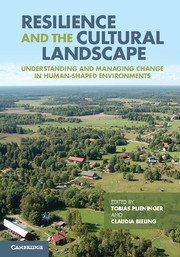 Resilience and the Cultural Landscape
Resilience and the Cultural Landscape Published online by Cambridge University Press: 05 November 2012
Introduction
All over the world, rapid and fundamental human-made environmental changes are occurring. Correspondingly, a research focus in environmental management and sustainability science is placed on the interactions of society and environmental systems (Kates et al., 2001; Liu et al., 2007). However, despite wide consensus on the need to focus on human–nature relationships, there is much controversy about their concrete nature and how they should be conceptualised (Scholz & Brand, 2011).
We compare two approaches to the analysis and management of these relationships that are usually considered to be clearly distinct from each other. On one side is the resilience approach to social–ecological systems of the Resilience Alliance (2012), a highly influential approach in the currently emerging sustainability science. It is put forward as a novel, scientifically well-founded and unbiased, value-free approach with general applicability that is concerned with the goal to ensure sustainable development. On the other side is the original version of the cultural landscape concept, which forms the basis of classical geography and, for decades, has been very influential in nature conservation and landscape planning, particularly in Europe and possibly most strongly in Germany. This concept has been shown to be connected with a conservative ideal of the human–nature relationship and to be largely motivated by cultural, symbolic and aesthetic values of traditional cultural landscapes – notwithstanding that now it is often at odds with its supposed sustainability.
To save this book to your Kindle, first ensure [email protected] is added to your Approved Personal Document E-mail List under your Personal Document Settings on the Manage Your Content and Devices page of your Amazon account. Then enter the ‘name’ part of your Kindle email address below. Find out more about saving to your Kindle.
Note you can select to save to either the @free.kindle.com or @kindle.com variations. ‘@free.kindle.com’ emails are free but can only be saved to your device when it is connected to wi-fi. ‘@kindle.com’ emails can be delivered even when you are not connected to wi-fi, but note that service fees apply.
Find out more about the Kindle Personal Document Service.
To save content items to your account, please confirm that you agree to abide by our usage policies. If this is the first time you use this feature, you will be asked to authorise Cambridge Core to connect with your account. Find out more about saving content to Dropbox.
To save content items to your account, please confirm that you agree to abide by our usage policies. If this is the first time you use this feature, you will be asked to authorise Cambridge Core to connect with your account. Find out more about saving content to Google Drive.